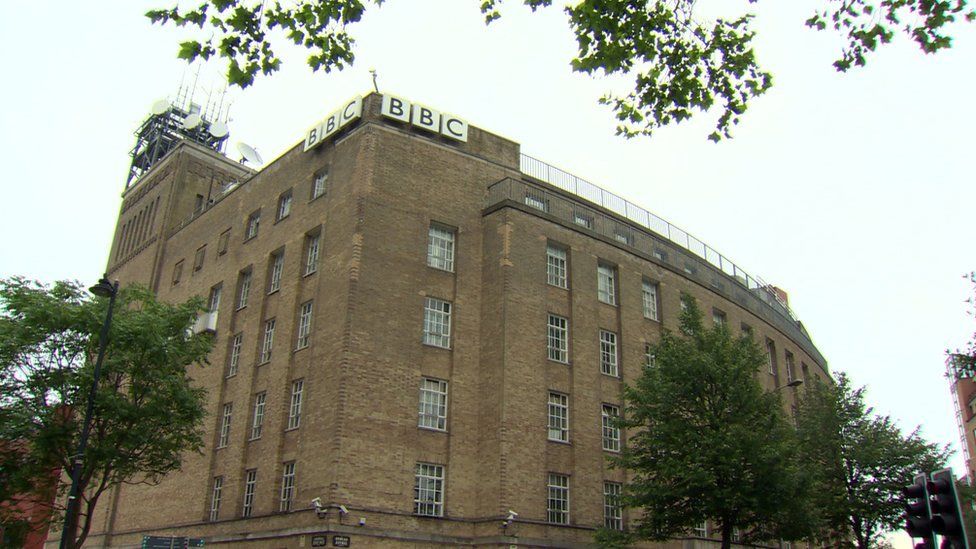ARTICLE AD BOX

BBC NI's workforce is generally older than the workforce in Northern Ireland as a whole, says Ofcom's report
By Robbie Meredith
BBC News NI Education Correspondent
Women are under-represented in BBC NI's workforce compared to Northern Ireland's overall working population, according to a new Ofcom report.
Research by the UK's communications regulator looked at the make-up of the workforce in several media companies.
BBC NI said it sought to reflect the diversity of local society, and had set targets to achieve by 2026.
For the first time, the BBC provided diversity data to Ofcom separately for England, Scotland, Wales and NI.
The BBC employed more than 21,000 staff in 2021-22, around four per cent of whom work in Northern Ireland.
National breakdown
Along with seven other broadcasters - ITV, Channel 4, Paramount (with includes Channel 5), S4C, Bauer, Global and STV - the BBC provided Ofcom with information about its employees in 2021-22.
The BBC was the only broadcaster to provide specific information for its workforce in each of the four UK nations.
Ofcom said it strongly encouraged other broadcasters to follow the BBC's lead in providing this data by location.
In its report - entitled Equity, diversity and inclusion in television and radio: 2021-22 - Ofcom compared the proportion of women employed by the BBC to the proportion of women employed overall in England, Scotland, Wales and Northern Ireland.
"The representation of women employed at all levels across the BBC generally reflected the make-up of the workforce in each nation, with the exception of Northern Ireland, where women were less well represented at the BBC than in the local working population," Ofcom said.
About 43% of the staff in BBC Northern Ireland were women, lower than Northern Ireland overall where 49% of workers are women.
In Northern Ireland, the BBC's workforce was also generally older than the workforce in the nation as a whole.
About 37% of staff were over 50, compared to 32% of workers in Northern Ireland overall.
Just more than half the staff in BBC Northern Ireland (51%) described themselves as religious - a higher figure than the BBC in any other part of the UK.
When it came to sexual orientation, seven per cent of staff in BBC Northern Ireland were described as LGBTQ - although there was no data on sexual orientation for 9% of staff and 4% preferred not to say their sexual orientation.
Higher working class figures
However, BBC Northern Ireland had proportionally more employees from working-class backgrounds than the BBC in any other part of the UK, said the report.
More than a quarter of staff in BBC Northern Ireland were from working-class backgrounds.
"The BBC's data shows people from working-class backgrounds are most represented in Northern Ireland (26%) and least represented in England (20%)," Ofcom said.
But it warned that people from working-class backgrounds were generally under-represented across the UK workforce of the eight broadcasters.
Overall, "13% of employees attended private school, compared to 7% of the UK working age population, and 62% of employees had parents in a professional occupation when they were aged 14, against the UK benchmark of 33%," said Ofcom.
Channel 4 was the broadcaster with the highest proportion of employees (16%) who had attended a private school, followed by the BBC and ITV with 13%.
The regulator also said disabled people continued to be significantly under-represented.
Continued improvement was needed to increase the number of people from minority ethnic backgrounds at senior-management level across the eight broadcasters, added the report.
A BBC Northern Ireland spokesperson said: "We seek to reflect the diversity of local society in the BBC's workforce and across everything that we do.
"We have made clear commitments in relation to the profile of BBC staff and the targets that we are working to achieve by 2026.
"All of this activity is underpinned by relevant legislation in Northern Ireland and is kept under regular review."

 2 years ago
35
2 years ago
35








 English (US) ·
English (US) ·